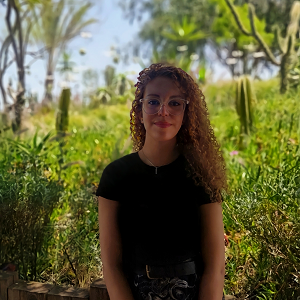Chahdi, Nihal Ouazzani

Research Interests:
Translation and Cultural Studies, Sufism in Contemporary Morocco, Ethics and Decolonial Studies
Geographical Area:
Morocco
Current Project:
Trances in Translation: Towards an Ethical Turn in Translating Alterity in the Moroccan Sufi Ritual al- ḍaḍra
Al-ḥaḍra is a spiritual Sufi performance that involves an altered state of mind and a unique experience of expanded consciousness accessed by individuals through meditation in a collective ritual. Al-ḥaḍra does not only aim at reaching divine knowledge but also moral and ethical advancement, and self-annihilation or al-fanāʾ. In this doctoral research, I aim to “translate” al-ḥaḍra, pushing the act of translation beyond its traditional limits by providing a translation of the poems recited during the ritual as well as conducting an ethnographic scrutiny of the ritual as a form of inter-semiotic and cultural translation. Furthermore, this research seeks to apprehend the individual experience of the divine as a process of meaning-making that contributes to the identity formation of these communities. It attempts to translate the affective experience of the participants in the ritual and to capture the melody of poetry recitations and rhythmic movement in writing.
The philosophy of ethics is the basis on which this multidisciplinary research rests. The ethical turn has a triangular presence in this project. First, I hope to explore ways of providing an ethical translation of the poems that embraces otherness and conveys its different aesthetics and rich dialogism that never cease to resist the homogenizing effects of English. Secondly, I would like to explore new ethical and decolonial methodologies in conducting ethnographic work as an alternative to the more epistemologically oppressive methodologies, in the hope of forwarding new knowledge about this practice as a part of Moroccan culture and identity. Lastly, I seek to excavate a local approach to ethical philosophy that has its origin in the Moroccan Sufi culture; to study al-ḥaḍra as special moment in the orientation of the Sufi community that promotes ethical practices in individuals. These reflections lead us to ask the following questions: What can an expression of a collective consciousness communicate about peoples’ subjectivity? How can such ritual be a factor of a much-needed social transformation due to the shared empathy and the communal purpose it serves? What potential does the study of this ritual have in developing a local concept of ethics built on empathy and connection, and that contributes to the advancement of the local community? And what contribution can Al-ḥaḍra have to a more pluriversal idea of ethics?
Further information (CV)

